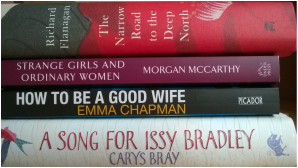 If I'd meant to take a photo of my foot I'd have done it better
If I'd meant to take a photo of my foot I'd have done it better This week, when Charli asked for a 99-word story about a photo bomb (a serious scene interrupted by something absurd or unexpected), I was still musing over Clare O’Dea’s post about horrible husbands in fiction. They make such great characters, yet they haven’t often taken a starring role in my own reading and writing. Nor are mine as deliciously evil as those Clare has dished up.

It’s not only female writers who find a way to excuse a husband’s infidelity: Richard Flanagan has described his Booker-winning novel, The Narrow Road to the Deep North, as a love story, yet little of that love can be found in his marriage. Morgan McCarthy is a little less sympathetic to Jasper in Strange Girls and Ordinary Women, but his extramarital affair is nevertheless addressed as less his problem than that of the two women in the triangle.
The most chilling husband in my recent reading is Hector in Emma Chapman’s How to Be a Good Wife. The control he asserts over Marta is camouflaged by a patient sympathy. But even this is left for the reader to decide whether to believe the husband or the wife.
Two of my short stories begin with straying husbands: The Good News and In the Interim, by sheer happenstance both on the same site. But to redress the balance, I also have a story there with a wandering wife.
The fictional wounded wives of my acquaintance are regrettably slow to punish their recalcitrant husbands. While Natalie Young serves up a dish of cold revenge in Season to Taste, her husband’s main offence seems to have been being boring.
So how much of this has found its way into my flash? I leave for you to judge.
Brian had been dead a year before I could face the photos. Our joyful innocence made me weep. Distant, but crystal clear, our marriage end was looming: it was breakfast time for lions too.





















 RSS Feed
RSS Feed





















